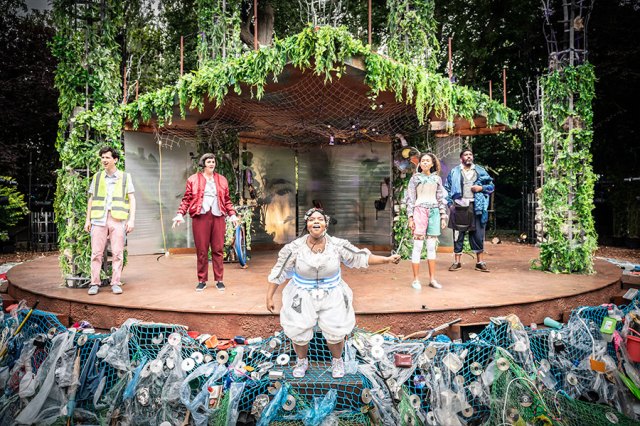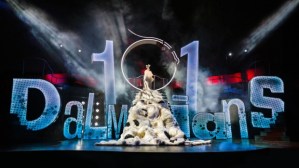The Tempest – re-imagined for everyone aged six and over at Regent’s Park Open Air Theatre – review
Shakespeare’s play is adapted for younger audiences

How do you get children interested in Shakespeare? I don’t remember caring much about him until I was well in my teens. It was weirdly a production of Cymbeline that eventually made me think he might be some good, and I don’t think anyone in their right minds would suggest that as an introductory text.
But people worry that given Shakespeare’s status, you’ve got to grab kids early. So, they roll out child-friendly productions and arrange school trips, and hope they do their work of making people understand that this man is Britain’s greatest poet and dramatist.
Into the fray steps this 75-minute adaptation of The Tempest, co-presented by the Regent’s Park Open Air Theatre and the Unicorn Theatre, billed as being “re-imagined for everyone aged six or over”. On the basis of an afternoon in the baking sun, with kids made fidgety by the sheer heat, I’d say that lower limit is too low – and that anyone over the age of 12 will find it quite mind-numbingly juvenile.
This is not to criticise the six-strong company who work astonishingly hard, most of them alternating parts, to bring the production to life. In fact, I’d really like to see all of them in a production of The Tempest. But director Jennifer Tang’s adaptation strips every ounce of meaning and poetry out of the play, reducing it to a not very interesting skeleton of a not very interesting plot.
Harry Blake’s songs, led mainly by Juliet Agnes’s sweet-voiced Ariel, are amiable and catchy enough for the audience to join in. But what does singing along with “Ban Ban Caliban” actually tell us about Caliban’s role in the play? Things are slightly better when Daisy Prosper as Miranda sings of her longing for love and her doubts about her identity, but it doesn’t really explain why The Tempest has lasted as long as it has.
Some of the rethinking is more successful. Chiara Stephenson’s two-level set, with its skeletal metal trees, exotic flowers and props made of recycled objects, is effective. Annie-Lunnette Deakin-Foster’s dance routines are enjoyably energetic. Making Prospero use an iPad in his cage of electronic paraphernalia to create his “rough magic” is a sensible touch of modernity.
But in many ways, it’s the simplest moments that work best. Prosper and Finlay McGuigan are charming as Miranda and Ferdinand, goofy with affection for each other; there’s a good joke about him a binman as he works away, cleaning up the island. There’s also a brilliant moment where McGuigan doesn’t quite know how to respond to Mark Theodore’s dignified Prospero, pulling back from a hug and going for an embarrassed fist bump.
This same gift for physical comedy means he is very funny as Trinculo, getting the audience onside when his co-conspirators begin to bully him. I am not at all sure anyone had any idea of the plot at this point, but everybody responded to his performance.
I wish the production had trusted its actors’ skills rather more. Its concept is so busy, it doesn’t leave enough space for imagination and engagement. It also reveals that when you strip The Tempest of so much language and plot, there really isn’t much there. Better to write a new play for children rather than leave Prospero and his doings so thoroughly beached.
















